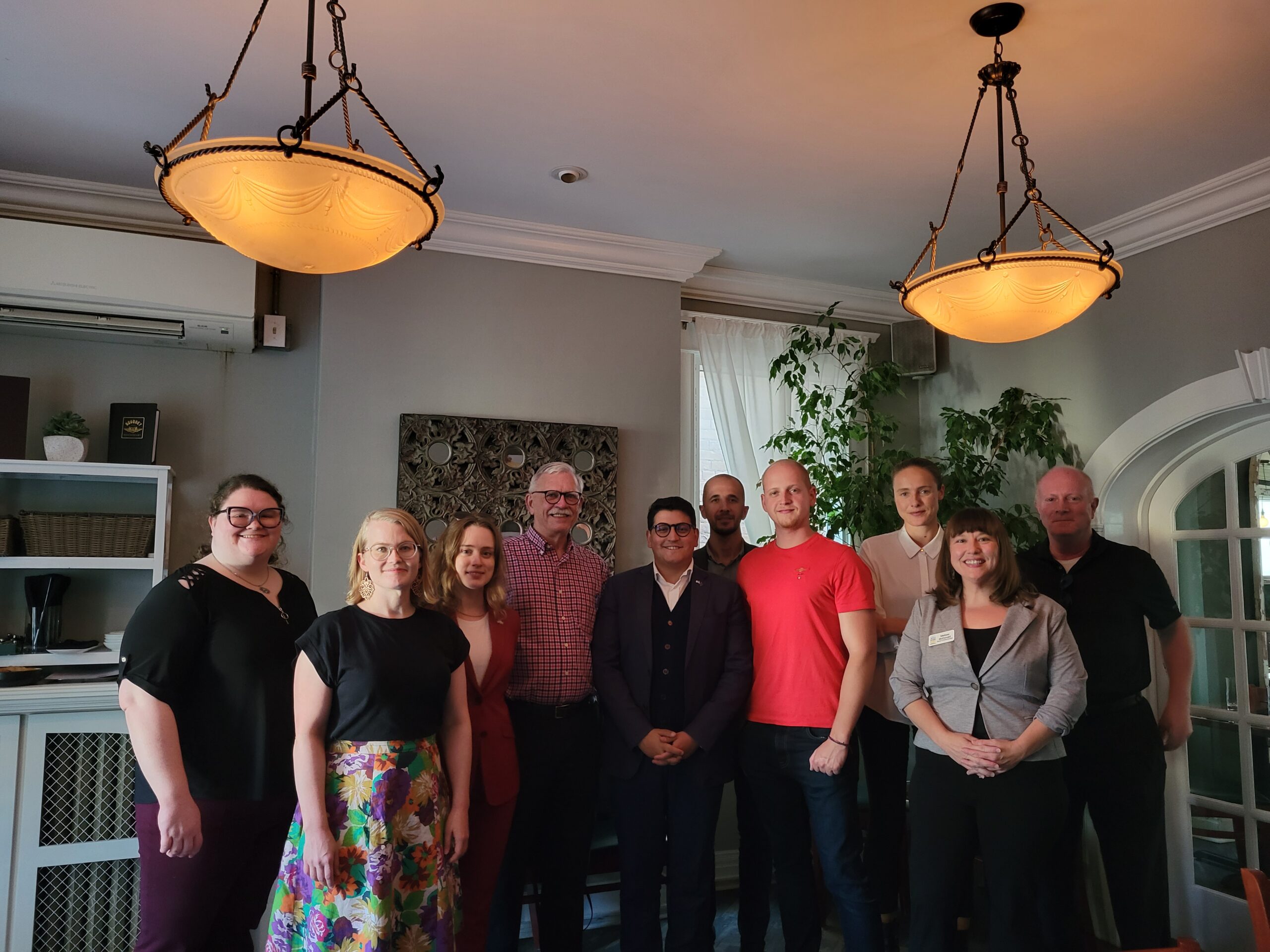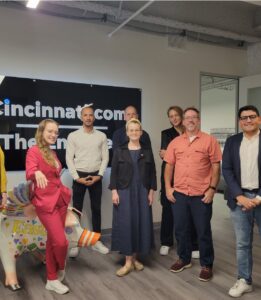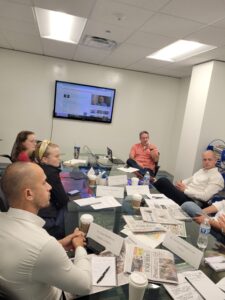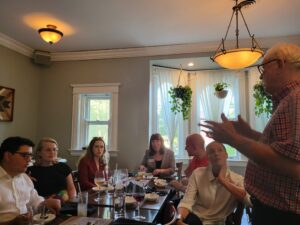Fall into Current Affairs! Young European Leaders Visit Part 2!

The Young European Leaders continue their journey!
To recap: during the week of September 27th, the World Affairs Council welcomed an eight-member delegation of young European leaders from Armenia, Belgium, Bulgaria, Croatia, Finland, Greenland, Italy, and the Republic of Türkiye. They had come to Cincinnati and Northern Kentucky for exposure to current U.S. social, political, and economic issues—and the associated policy formulation.
Here are a few more highlights from their meetings with our local community resources and partners!
Cincinnati Enquirer
The delegates met with the Cincinnati Enquirer to discuss culture wars affecting journalism and education. This is something that they have seen in on the news and were curious about.

Delegates with Flying Pig in front of Cincinnati Enquirer’s office.
The advice of Carl Weiser, Editor-Government, Politics, and Business is that it is crucial to let kids grow up and give them the space to analyze information. They need to learn to figure out what information is right or wrong for themselves without the overreach of school boards. However, there are challenges to allowing kids to do this, such as the overwhelming flood of information on all media platforms, and the information silos. These silos are created when only information from one side is being taken in.
Delegates were curious about why the school board are so adamant about de-diversifying schools. Weiser explained that school boards, while elected, are made up primarily of current, or past, parents. School is something that see and are immediately involved in.
However, these culture wars are not new. They have always existed in one form or another. The rise of social media, podcasts, news shows and digital articles, and information silos have exacerbated the issues. These new platforms have also made these issues far more accessible.

Carl Weiser, top right, meeting with delegates.
During the conversation, the delegate from Italy was surprised to learn that anyone in the United States could become a journalist. He explained that in Italy there was a rigorous process to becoming a journalist. One must pass a written exam—one that he compared to the lawyer’s BAR exam. If one doesn’t pass, then you are recognized as a publicist. There is a clear distinction between the two in Italy. The third classification is a blogger—this is someone who puts out information but has not attempted to take the written exam.
The journalist from Croatia was curious about whether the Cincinnati Enquirer had ever used AI. According to Weiser, the Cincinnati Enquirer does not use AI. It was tried in Columbus, but the writing was really bad and not completely factual. He did mention that they can use it to transcribe videos, making AI a time saver, but that was the extent of AI use by the Cincinnati Enquirer.
One delegate said that their favorite meeting was with Weiser, stating that,
“…We got to ask and understand a lot about current issues by having an open and critical dialogue comparing it to our own experiences. He showed us current articles they have written on the screen while we’re having discussions and we could ask directly on the current issues the paper had addressed.”
Reception with Mayor Joseph Meyer
On their last day in the Cincinnati and Northern Kentucky area, the delegates went to meet Mayor Meyer at Bouquet restaurant in Covington, located in the beautiful, historic building on Main Strasse. Mayor Meyer welcomed the delegates warmly with the traditional Kentucky warmth.
Once everyone was settled, they began to talk about the challenges that every small city faces and the initiatives that Mayor Meyer has been consistently working over the course of his career in public service. The delegate from Italy spoke about the economic hardships Italy faces as young people continue to leave Italy. He was utterly amazed by the transformation of Covington, once named one of the most distressed cities in the United States by the Federal government, to a thriving suburban area. Just walking down the street to the restaurant on a Friday evening, the delegates could see people flocking to the restaurants, walking their dogs, laughing on their way to the bars. Many of them young professionals who were looking forward to enjoying the weekend after work.

Mayor Meyer, right, speaks to delegates at Bouquet restaurant in Covington, KY.
Mayor Meyer joked that when people used to ask him how he had turned Covington around almost overnight, he would tell them “It was forty-five years of hard work!”
Mayor Meyer explained it is the small things that really turned Covington around. He sited the Covington Small Business Program—a the rent subsidy program for small business owners to promote the creation and continuation of businesses, the Façade Improvement Grant for Covington business owners to improve their business and make it more inviting, the Homebuyer Assistance Program for first-time homebuyers, and the Read Ready Covington Initiative which promotes literacy for young children as ways to attract people to Covington, keep them there, and keep them happy.
In a post-program survey, one delegate said that the most impactful thing said to them during any of their meetings was from Mayor Meyer,
“If you take care of the ‘little issues’ the bigger problems usually take care of themselves.”
Mayor Meyer says,
“Meeting young and upcoming world leaders is such a privilege. Having the opportunity to learn from them and provide them with insights and answers to their questions is a treat.”
Conclusion
Social, political, and economic issue are not some far away thing—or even something that we think about every so often. These issues are real. They are here. They are something that affect everyone in the Greater Cincinnati area every day at every level.
We would like to thank our local resources for meeting with our international visitors and making this program such a success.


